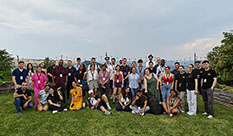More:
News & Stories
Israel's First Institute for Responsible AI Opens at HIT
HIT Holon Institute of Technology establishes the new Applied Research Institute for Responsible Artificial Intelligence, positioning Israel at the forefront of AI governance and ensuring responsible and regulatory use of artificial intelligence technologies. This is the first of five applied research institutes that will open at HIT to address technological challenges of the coming decades.

Hadas Lorber. Photo: Esti Photography
The new institute, which will bridge technological innovation and social responsibility, is expected to influence industry, academia, and public policy by developing ethical frameworks that ensure fair, transparent, and responsible use of AI technologies.
Establishing the institute is a significant step towards creating a balance between technological innovation and social responsibility. "We intend to lead research and development in digital health, smart cities, and education while ensuring fair and transparent use of AI technologies. Our goal is not only to understand the impacts of AI but also to formulate solutions that allow organizations to adopt responsible artificial intelligence in a practical manner," says Hadas Lorber, head of the Applied Research Institute for Responsible Artificial Intelligence, member of the expert forum advising the government on AI regulation and policy, and co-chair of the international strategy group in this framework.
The increasing use of AI technologies presents complex challenges in algorithmic bias, transparency, data privacy, and legal responsibility. The institute will focus on analyzing and reducing biases, developing systems, and defining legal responsibility for decisions made by algorithms.
As part of the growing need for fair and responsible use of artificial intelligence technologies, significant issues of transparency, data privacy, and algorithmic biases arise. The new institute at HIT aims to lead change in the field and ensure that industry, together with academia, encourages and implements responsible artificial intelligence applications while protecting public rights.
The institute will combine theoretical research with applied projects in areas such as digital health (AI in medicine while maintaining data privacy in various aspects), smart cities (traffic management while preventing violations of citizens' privacy), education and the future job market (development of personalized systems). Additionally, "regulatory sandboxes" will be established – controlled experimental frameworks that will allow companies to develop and test AI products under supervision before their commercial launch.
The institute will promote collaborations with industry companies, universities, and research institutes in Israel and worldwide, focusing on creating international standards, model reliability testing, and establishing advanced regulatory frameworks.
Although regulation in the field is still evolving, technology companies and startups understand that adopting responsible AI principles improves user trust and helps enter international markets. The institute will provide companies with tools to implement ethics in artificial intelligence alongside assistance in formulating regulations, in collaboration with the Knesset and government.
Among the institute's central goals: leading research and innovation in responsible AI, creating national and international regulatory frameworks, and training the next generation of researchers in the field. The institute will offer scholarships and training programs, organize professional conferences, and promote public awareness of ethical issues in artificial intelligence.
Prof. Eduard Yakubov, President of HIT Holon Institute of Technology: "In a world where artificial intelligence is becoming a central tool in almost every field, we must ensure that its use is controlled and thoughtful. HIT has made the integration of innovation with social responsibility its banner, and the new institute will serve as a platform for research and development of tools that ensure these technologies serve society rather than endangering it. This is another step in positioning HIT as a leading academic institution in the field of AI."
Dr. Refael Barkan, Vice President for Innovation, Entrepreneurship and Internationalization, HIT Holon Institute of Technology: "Responsible artificial intelligence is essential for both applied academia and industry, strengthening the necessary connection between them by enabling research collaborations, developing relevant internship programs, and implementing ethical solutions to real problems. All this while creating a bridge between theory and practice and exposing students to challenges and real solutions that maintain ethical principles in different content worlds."
- News & Events
International Week of Interdisciplinary Studies and Academic Collaborations in Crete
A substantial delegation of 16 students and four faculty members from HIT Holon Institute of Technology participated in week-long international activities and events at HMU-Hellenic Mediterranean University in Crete. ...


 Additional programs
Additional programs
